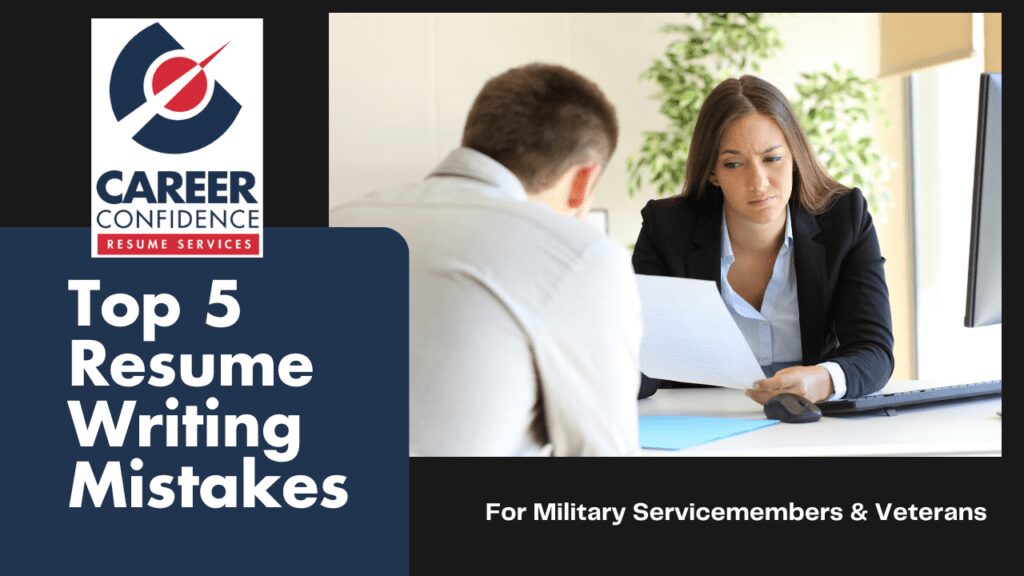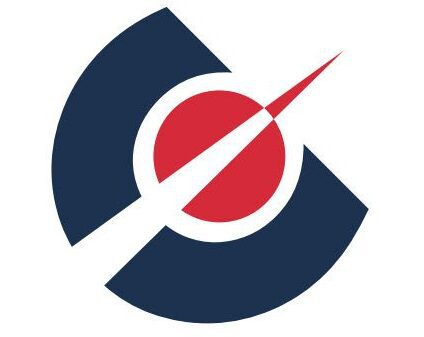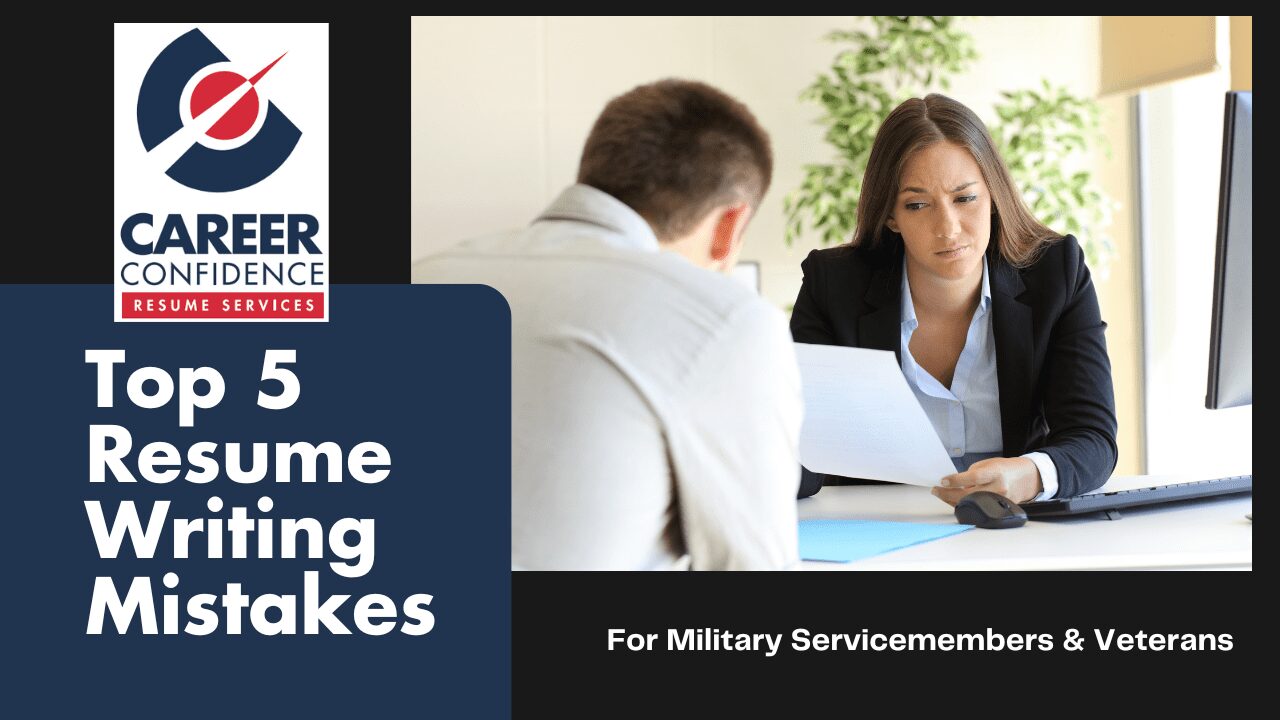
I love helping veterans successfully transition from military careers to the civilian workforce. Having worked with commissioned officers, NCOs and enlisted personnel, I am always humbled by their accomplishments, sacrifices, and humility. Then, they ask me the heart-breaking question: “Why aren’t I getting called for any interviews?” As a professional resume writer, I’ve been asked that question hundreds of times over the past five years.
Here are the five most frequently made resume mistakes that prevent veterans from getting civilian job interviews.
Mistake #1- You have an “Objective” instead of a “Summary of Qualifications
Resumes were formatted with objective statements for many decades. They described what the candidate wanted to get from the job. Today, resume objectives are dead; they have been since before 2000. Companies want to know what you can do for them, not what you want to do.
The top third of your resume is platinum real estate because it’s where hiring managers spend nearly 80% of their time. Successful candidates feature their Summary of Qualifications, or Career Highlights, and front load the resume with skills and qualifications that prove they are uniquely qualified for the position.
Your strategic summary sums up your unique experience and achievements in just 5-6 lines. I recommend including the following:
- Number of years of experience in the field you’re applying for.
- Largest dollar amount of property, assets, and equipment you’ve managed.
- Dollar amount of the largest budget you’ve managed.
- Major dollar amounts in project(s) managed at one time.
- Largest number of personnel you’ve led at one time.
Mistake #2-Using the Same Resume For Every Job
This is the #1 mistake among all job seekers. Writing your resume is a tedious task so it’s no wonder that many people only use one. Here’s the problem: About 95% of companies use Applicant Tracking Systems (ATS). These “robots” read every resume to weed out the majority of resumes, every single day. With so many people competing for the same jobs, this is the only way employers can sift through such a large quantity of resumes.
The fact is that 88% of resumes never make it to an actual human being.
Of course, these systems aren’t precise, and even a strong resume may be kicked out if there is a problem in formatting. To help you make sure your resume is ATS-proof, you need to know what format can confuse the system. Also, if you don’t have the minimum keywords from the job description within your resume, the applicant tracking system will toss your resume out, even if you are qualified for the position. For more detail on how to pick out keywords, check out, “How to Ensure Your Resume is On-Target.”
If you don’t have the time or experience picking out those keywords and tailoring your resume, consider investing in a professional resume writer who can show you how to properly include these crucial keywords/phrases so that both a robot and a human being can easily interpret your qualification.
Mistake #3-Not Including Quantifiable Data
You know the saying, “The numbers don’t lie.” Well…I think that is BS!
However, numbers are very powerful. And, typically, the higher the number the more powerful.
When writing a resume, quantifiable data—numbers—dollars—percentages, should be included everywhere possible!
Below are examples of incorporating a military award so employers understand their value.
- Received Air Force Achievement medal for leading team in over 600 hours of administrative support.
- Moved $500M in critical assets while restructuring supply, maintenance, and financial programs resulting in an 80% percent increase in equipment serviceability.
- Received meritorious service medal for 100 percent supply inventory accountability valued at $25.5M and recovered 1,256+ consumable parts.
- Prepared 200 critical meteorology and oceanography briefs and recorded 2,500 surface weather observations which directly contributed to more than 2,000 hours of mishap-free flight operations.
- Raised $20K and volunteered 50 hours as a tutor and mentor to students at a local elementary school.
Mistake #4-Grammar & Punctuation Errors
Let me preface by saying this mistake is one of the most common and also the most effortless to fix, if you have the right tool. A recent study by Grammarly looked at 50 active résumés on Indeed.com and learned the following:
- 60% of errors on a resume are grammatical.
- Male job seekers average more than 6 grammar, spelling and punctuation mistakes in their resumes.
- Female job seekers make an average of 4 grammar, spelling and punctuation mistakes.
- Job seekers from the southern U.S. make the most mistakes (6) on their resumes compared to the northeast (3.9), Midwest (3.6) and West (3.6).
Nothing is worse than proofreading an email or document for a potential employer, only to realize you wrote “there” instead of “their.” Another common mistake is miswriting “you”, “your” or “you’re.” It looks like this: “I was extremely excited to see the open position for a Fundraising Regional Director on you company’s website.” (Spell-check is not going to pick up the difference between you and your).
That’s a big OOPS! Plus it’s just cringe-worthy after you worked so hard to make sure your entire job application shows off your experience, knowledge and skills.
The best application on the market to prevent proofreading and grammar flubs is Grammarly.com. Grammarly is one of my favorite tools because it can check for errors in emails, social media posts, blogs and online job applications. Even someone who is a grammar and punctuation pro can use an extra pair of eyes to ensure their documents are perfect.
You can try this tool for free by going to Grammarly.com. If you like it, I highly recommend buying a yearly subscription for about $12 per month. It will not only save you the precious time it takes to proofread the thousands of words you write weekly, but it can also save you any embarrassment. More importantly, it might help you land that job.
Mistake #5-Your Resume is Too Long
There is a big difference between a civilian/private sector and a Federal resume. The difference is that a civilian/private sector resume only goes back roughly 10 years while a Federal resume spans your entire career and can be as long as is necessary.
So, what is considered too long? That depends on your field and years of experience. Let me start by covering two exceptions to the length rule.
Curriculum Vitae (CV’s) which means a course of life in Latin. A CV is primarily used in the education field, or when applying to countries outside the U.S. and Canada. It’s a lengthy document because it includes in-depth information about your experience, accomplishments, honors, awards, publications and presentations. Therefore, a CV isn’t subject to a certain length.
Government/Federal Resumes. If you’re applying through USAJobs.com, your resume does not need to adhere to a certain length. Like a CV, it doesn’t need to include as much in-depth information about your career as possible.
I suggest including ALL professional experience whether it is relevant or not.
For all other job seekers, here is the general rule:
- Less than 10 years: 1 page
- 10 to 20 years: 1 – 2 pages
- More than 20 years: 2 pages max!
In addition to this rule, there is one critical question you must ask yourself, “Is this experience relevant?” No matter how many years of work experience you have, if it’s not related to the position you are applying for, don’t include it. Employers want to know about your experience, skills and knowledge that will directly contribute to that particular position.
Furthermore, you could have a Ph.D. and 30+ years experience in your industry. But, no hiring manager wants to look over a 5-page resume. Show the hiring manager that you value their time, and you’re not long-winded. Cut it down to 2 or 3 pages, then explain your knowledge and expertise in much more detail during the interview.
If you’re concerned your resume could have more mistakes complete this contact form to get a free resume review.
Written by Cassie Hatcher, CEO of Career Confidence LLC, a Certified Professional Resume Writer (CPRW) and Certified Veteran Career Strategist (CVCS) who translates military leadership experience to ensure your resume is on-target for the civilian workforce.
For 8+ years, Career Confidence Resume Services has specialized in translating military experience into accomplishments-focused resumes. Our goal is to help military service members to find their next mission with a resume that captures employers’ attention and highlights their unique military experience.
If you are a military service member, click here to get in contact with us
If you are a civilian professional, manager, or executive click here to contact us
We have a couple of great resources including a free quiz specific for Military & Veterans to answer the question “What Type of Resume Do I Need?” This quiz takes 5 minutes on average to complete.
Also, grab your Free Military to Civilian Resume Template, where you can insert your experience, education, training, and certifications. Take the guesswork out of securing civilian employment and successfully transition from military-to-civilian employment.

